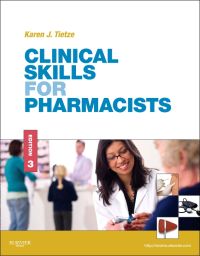Clinical Skills for Pharmacists, 3rd Edition
Covering the skills needed for pharmaceutical care in a patient-centered pharmacy setting, Clinical Skills for Pharmacists: A Patient-Focused Approach, 3rd Edition describes fundamental skills such as communication, physical assessment, and laboratory and diagnostic information, as well as patient case presentation, therapeutic planning, and monitoring of drug intake. Numerous case examples show how skills are applied in clinical situations. Now in full color, this edition adds more illustrations and new coverage on taking a medication history, physical assessment, biomarkers, and drug information. Expert author Karen J. Tietze provides unique, pharmacy-specific coverage that helps you prepare for the NAPLEX and feel confident during patient encounters.
Covering the skills needed for pharmaceutical care in a patient-centered pharmacy setting, Clinical Skills for Pharmacists: A Patient-Focused Approach, 3rd Edition describes fundamental skills such as communication, physical assessment, and laboratory and diagnostic information, as well as patient case presentation, therapeutic planning, and monitoring of drug intake. Numerous case examples show how skills are applied in clinical situations. Now in full color, this edition adds more illustrations and new coverage on taking a medication history, physical assessment, biomarkers, and drug information. Expert author Karen J. Tietze provides unique, pharmacy-specific coverage that helps you prepare for the NAPLEX and feel confident during patient encounters.
New to this edition
- A full-color design and an increase to 150 photos and drawings better illustrates concepts, techniques, and equipment.
- Updated Taking Medication Histories chapter includes added coverage of the data to obtain while taking a medication history, as well as additional sections on obtaining medication names, on-demand medication information, and the pharmacist's role in immunization.
- Updated and expanded Physical Assessment Skills chapter includes detailed descriptions of commonly used equipment and vital signs, with more pharmacist-specific examples, so you can feel more confident in handling real-life situations.
- Updated Researching and Providing Drug Information chapter reflects current technology and information sources, and includes review questions on drug information.
- A new biomarker section in the Review of Laboratory and Diagnostic Tests chapter aids in treatment planning, explaining the different types of biomarkers and how they are used.
- Skills checklists cover how to perform clinical skills, such as developing a monitoring plan.
- Application activities at the end of each chapter include more case studies to help you apply concepts and solve problems.
- A Chapter Acronym Index conveniently located on the front and back inside covers offers easy lookup for many commonly used acronyms and their definitions.
- Video clips on the companion Evolve website show a pharmacist performing various clinical skills, including history taking and physical assessment.
- Animations on Evolve show key disease states and highlight other relevant concepts, and an audio glossary includes pronunciations of 241 terms.
Key Features
- Coverage of clinical skills prepares you to be more involved with patients and for greater physical assessment and counselling responsibilities, with discussions of communication, taking a medical history, physical assessment, reviewing lab and diagnostic tests, and monitoring drug therapies.
- A logical organization promotes skill building, with the development of each new skill building upon prior skills.
- Learning objectives at the beginning of each chapter highlight important topics.
- Self-assessment questions at the end of each chapter help in measuring your comprehension of learning objectives.
- Professional codes of ethics are described in the Ethics in Pharmacy and Health Care chapter, including confidentiality, HIPAA, research ethics, ethics and the promotion of drugs, and the use of advance directives in end-of-life decisions.
- Numerous tables summarize key and routinely needed information.
- Downloadable, customizable forms on the companion Evolve website make it easier to perform tasks such as monitoring drug intake and for power of attorney.
Author Information




